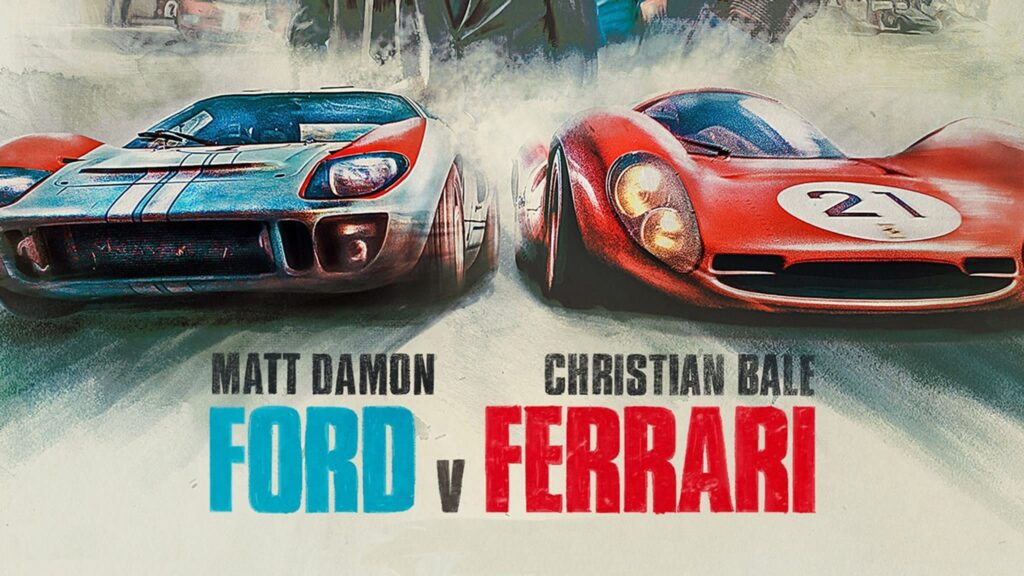The Dark Herald Recommends Ford Vs Ferrari

Nothing pisses me off more than coming in Second.
If I take third place, I’m still unhappy but I’m also calm and resigned. Show, was clearly going to happen long before I got to the end. The game didn’t develop right. I threw the dice on a play that didn’t work out. The opportunity to pull ahead was never there. Plain old bad luck is a genuine factor. Like I said, unhappy but calm and resigned. I knew what was coming.
Second place leaves me seething. I was absolutely in the running. I had made the right plays. I had pushed past the rest of the losers to include the resigned chump who was clearly going to come in third. I had thrown the dice and they came up sevens and elevens. The win was almost there, but I didn’t get across the finish line first before that son of a bitch who did.
And there are few things more ecstatic than the come from behind win. The one where you think you were blocked out and you are staring at third place Show but then you get that one little opening and that was all you needed to slip the knife in. All you needed to push past the other two guys and come out on top.
Triumph. Victory. Success. Conquest.
There is no better feeling in the world. I get the guy who really wants to win.
And Ford Versus Ferrari really speaks to me. It was a fantastic film. They did everything right, and everyone did their level best to bring their A-Game.
For those who have never watched Top Gear or who just don’t like cars. Ford versus Ferrari is about the legendary grudge match between the David and Goliath of 1960s motor racing. Enzo Ferrari and Henry Ford II (grandson of Henry Ford).
Enzo Ferrari absolutely felt the bone-deep drive to come in First. He was a professional racer himself with a record of eleven wins in forty-one races. He knew that competition was what would drive a man past his limits and he frequently pitted his drivers against one another. He was a man chasing perfection and by 1962 he had caught it. But the price had been laid too high. Ferrari Motors was bankrupt. Worse still, this was on the heels of a massive walkout by some of his top talents. The only thing Enzo could do was sell his company. Being Italian he looked for an Italian buyer. Someone who understood at an instinctive level, how he needed to do business. Fiat was indeed interested, and they were serious. Fiat would own the Ferrari Motors, but Ferrari Racing would be a separate company controlled by Enzo. It all looked good. It was everything he wanted.
Except that Fiat wanted to pay him a lot less than what Enzo wanted for his company.
Then as luck would have it another buyer showed up. One, that Enzo would have no trouble pitting against Fiat.
Ford Motors was having its own problems at the time. Men of the Greatest and Silent Generations had reached the point in their lives where they wanted to drive something a lot sexier than a four-door sedan. GM beat Ford to the marketplace with the Chevelle. Lee Iacocca was pushing the Mustang forward however it wouldn’t be on the road for a few years. Ford needed something now, so the idea was floated to just buy a sports car company in Europe and build Americanized versions of it immediately.
The offer was made, and Ferrari seemed quite serious about it. Months of negotiations proceeded forward with a view towards merger.
There is no doubt in my mind that Enzo Ferrari had no intention of ever selling his company to Ford. Not if he could help it. Enzo built race cars, that was his driving passion. He only sold cars to fund his racing team. I strongly suspect he was deeply revolted and utterly disgusted by the idea of his beautiful handmade, one at a time, cars being ground out like sausages on a Detroit assembly line.
In fact, I’m certain of it given the things he said to Ford’s representatives after Fiat finally made the offer, he had wanted all along. It must have been boiling inside of him for months, gnawing at his guts constantly, wondering if he was actually going to have to go through with it. The deal that would turn Ferrari Motors into everything he didn’t want it to be.
At the last minute, he didn’t just reject Ford’s offer, he exploded. Ferrari heaped as much humiliation as he could on the Ugly Americans who had come to buy his company.
Enzo Ferrari was reported to have said, that Fords were ugly little cars, made in an ugly factory and that Henry “The Deuce” Ford II was not the man his grandfather was. That he was no Henry Ford.
The Deuce was incensed. Revenge would be had, and it would come for that thing that Enzo Ferrari prized the most. Victory at Le Mans.
Ford Motors needed this to be an American win, so they went to the only American who had ever won Le Mans, Carrol Shelby. Shelby had his own boutique sports car company and he put together a team whose job it was to win at Le Mans. The first time out at Le Mans was a failure but then Shelby brought in British driver Ken Miles who led Ford’s team to victory. Six months later Miles was in a fatal crash while testing out a new version of the Ford GT40.
Those are the events. But events aren’t a story, and a story succeeds or fails by the style of its telling, and Ford Versus Ferrari succeeded magnificently. It was Christian Bale’s best performance ever as Ken Miles, a man who was absolutely driven by his need to win. He almost couldn’t function in any other way. His drive to achieve victory was fundamental to his existence. Matt Damon brought the goods as Carrol Shelby, who was just as driven by the need to win but had been taken out of the driver’s seat by a heart condition. Jon Bernthal managed a surprisingly worthy job in his role of Lee Iacocca, the sympathetic figure at the Ford Company man who was backing Shelby Racing but was up against Ford bureaucracy as represented by the reptilian Leo Beebe portrayed by Josh Lucas.
Beebe probably wasn’t all that evil, but he unquestionably made the decision that cost Ken Miles the victory he had fought tooth and nail to get at Le Mans. Regardless, every story needs an antagonist. Finally, we have Tracy Letts as Henry Ford II, the very entitled lesser grandson of a great man, and deep down inside he knows it. In the end, Enzo Ferrari came across as the better of the two men.
This was a great film about men who have a drive to come in first and the cost that comes with it. It’s a fantastic movie.
This was a complex and personal story that completed succeeded.
And critics absolutely hated the style of its telling. This isn’t the tale they wanted to be told at all. Rotten Tomatoes gives it 92% positive review but if you actually read the reviews most of them are either damning with faint praise or just getting the good things, they have to say out the way before they start bitching.
And what they are bitching about is a film about White Men. They couldn’t stand how many white men were in this story. Where were the disenfranchised blacks? Where were the oppressed women? The only woman in it was a housewife who was happy to be in her home.
They knew they had to do something about that.
What is the modern critic’s function, after all?
From Phillip Greenspun’s blog: (Don’t click on it)
He brings an intersectional lens grounded in social justice praxis to the classroom and is passionate about racial, gender and LGBTQ justice and issues of representation in film. Brad believes that the Western film canon is essentially a survey of what bell hooks calls “the imperialist white-supremacist capitalist patriarchy.” Any creative work that we do must reckon with this history of oppression, extract from it what serves us, and dismantle and discard what does not.
So, after you’ve fired up the bulldozer and plowed your way through the SJW word-salad, you are left with a clear mission statement: The job of the modern film critic is to be a propagandist.
That’s why critics do what they do now. It is why you can’t trust them in the least. Their job is no longer to try and tell you if a movie is good or not. It is to inform you of whether or not you are allowed to see it.
It is why good movies are getting routinely trashed these days when they aren’t trying to advance SJWism. And while critics have so far had indifferent success with promoting godawful films that are rated NPC. They have had a great deal of success in damaging good movies.
Thanks to their efforts Ford Vs Ferrari bombed on its opening weekend and didn’t make much more than $200 million against a budget of $100 million. It deserved to win as much as Ken Miles did and was just as cheated by the little men who knew that they were little men.
But there is just a little light on the horizon. Critics can’t seem to do anything to stop a good movie that people have already heard about. They tried their damnedest to trash Joker and it made better than a billion dollars on a budget of seventy million. But it was based and word about that got out.
No one trusts the opinion of critics anymore. They are dime a dozen. They are all for sale. And everyone knows it.
The Dark Herald Recommends with Enthusiasm

